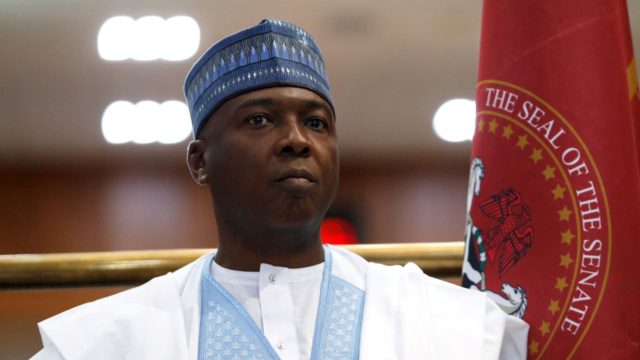 A Federal High Court sitting in Abuja has deferred hearing on fundamental right enforcement suits filed by the former Senate President, Dr. Bukola Saraki.
A Federal High Court sitting in Abuja has deferred hearing on fundamental right enforcement suits filed by the former Senate President, Dr. Bukola Saraki.
Saraki had filed the suits to stop the Economic and Financial Crimes Commission, EFCC, from re-opening investigation against him.
The suits were originally scheduled for hearing on Monday (today) but were however, adjourned till July 2 to await the outcome of a petition the EFCC lodged against Justice Taiwo Taiwo who is presiding over the matter.
The anti-graft agency had in a petition it sent to the Chief Judge of the High Court, Justice Abdul Abdul-Kafarati on May 21, accused Justice Taiwo of being biased against it.
In the letter that was personally signed by EFCC’s Acting Chairman, Ibrahim Magu, the agency, decried that the Judge had on May 9 and 14, granted two different ex-parte orders that restrained it from continuing its investigations against both Saraki and the erstwhile governor of Imo State who is now in the Senate, Rochas Okorocha.
Consequently, the EFCC prayed the High Court CJ to transfer the two suits that were separately lodged by Saraki and Okorocha, to another Judge for hearing.
At the resumed proceeding on the case on Monday, Justice Taiwo adjourned the planned hearing to await the outcome of the petition against him.
The Attorney General of the Federation, AGF, had through the Solicitor General of the Federation, Dayo Apata, filed a counter-affidavit for the suits to be dismissed as lacking in merit.
Similarly, counsel to the EFCC, Chile Okoroma, equally queried the competence of the suit, adding that the anti-graft agency had also filed processes to oppose it.
Justice Taiwo had directed all the parties to exchange filed processes to enable the court to proceed to full blown hearing of the matter, before the petition was entered against him.
Other respondents in the matter include the Department of State Services, the Inspector-General of Police, the Independent Corrupt Practices and other related offences Commission, and the Code of Conduct Tribunal.
Saraki had on the strength of an ex-parte motion he filed alongside the two suits, secured an interim order that stopped the anti-graft agencies from probing or seizing his assets.
The court directed that all the respondents should maintain status quo, pending determination of issues the Application raised before it in the suit marked FHC/ABJ/CS/507/2019 and FHC/ABJ/CS/508/2019.
Justice Taiwo said he was minded to grant interim reliefs to Saraki to avert a situation where the court would be faced with a situation of fait accompli.
He held that granting the order was in line with a settled principled of law that once a suit was filed, all parties to it must refrain from taking any action capable of rendering the matter. nugatory.
The Judge maintained that the law permitted such an application to be granted in a situation where the applicant would likely face “hardship” between the time of serving processes in the suit on the Respondents and hearing and determination of the case.
“By the provision of Order 4(3) of the Fundamental Rights Civil Procedure Rules, 2009, the court may, if satisfied that the applicant may be caused hardship before the service of an application where liberty or life of the applicant is involved hear the application ex-parte upon such interim reliefs as the justice of the application may demand
“There is no doubt that in making the interim reliefs or orders, the court is guided even in its exercise of its discretion judicially and judiciously applied by the law and statues.
“Here comes in the rules and of course Constitution of the Federal Republic of Nigeria.
“I am of the view, after due consideration of the aforesaid averment, that this court ought to make the order being sought by the applicant pending the hearing and determination of the originating motion on notice.
“To do otherwise and not to restrain the respondents by asking them not to stay action will result in the court being faced with a fait accompli”, Justice Taiwo held.
However, the EFCC had since dragged the Judge before the National Judicial Council, NJC, accusing him of attempting to prevent it from performing its statutory function.
Source: Daily Post NG








So the drama with Saraki is not over yet?